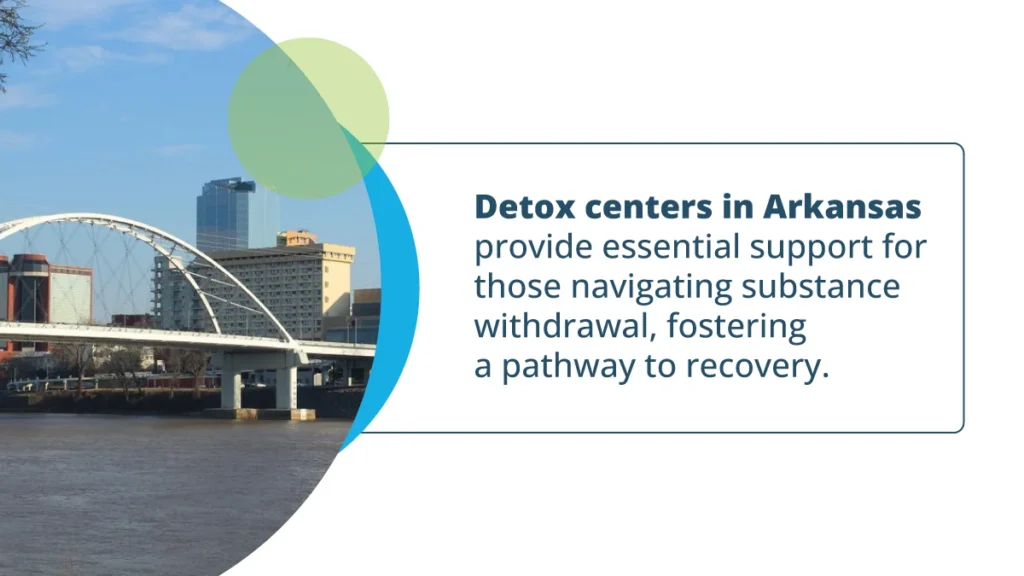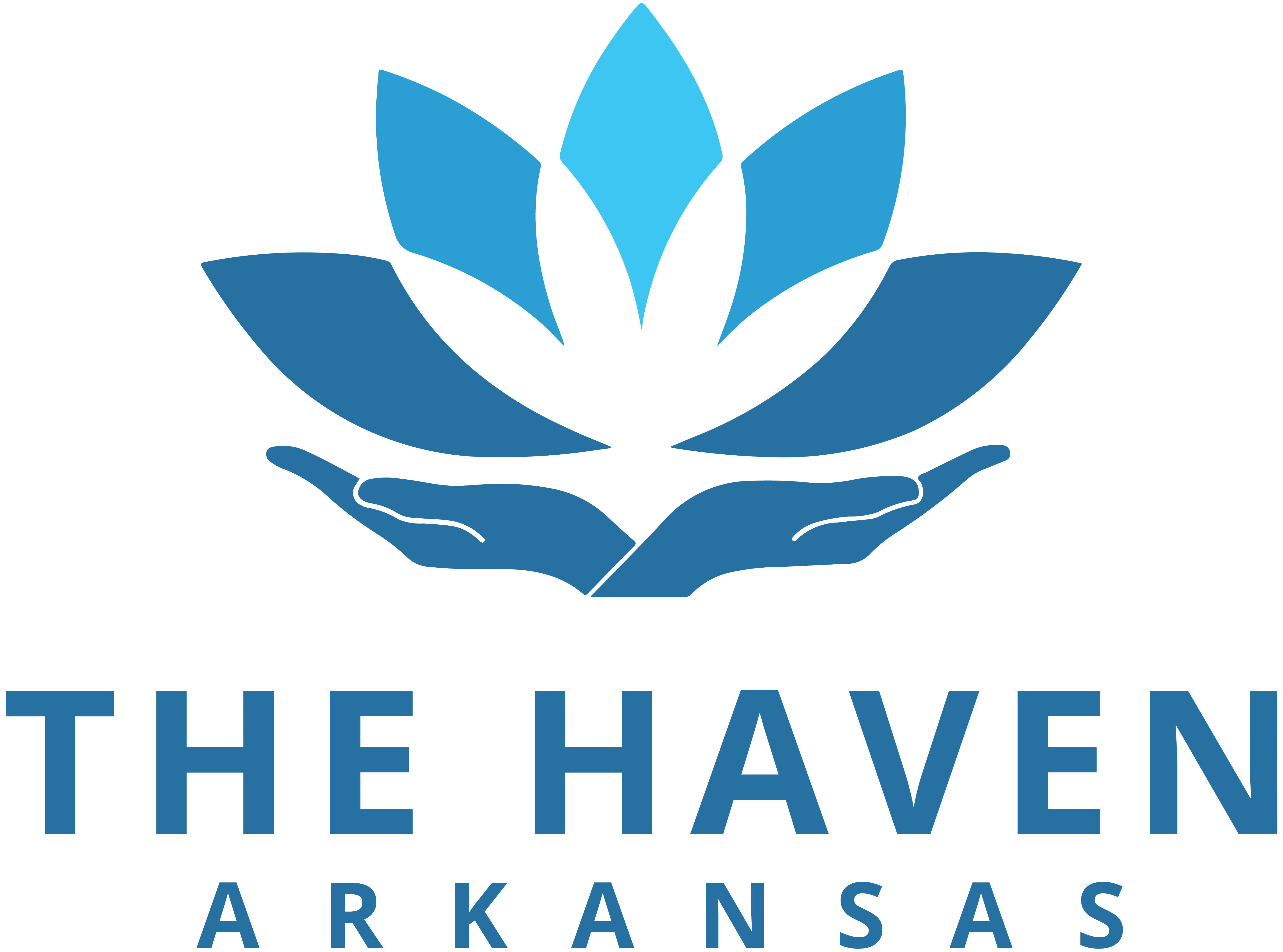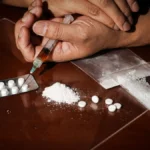Detox centers in Arkansas play a vital role in helping individuals recover from substance abuse by providing a safe and supportive space for detoxification. These centers offer medical supervision and specialized care to manage withdrawal symptoms, ensuring a smoother transition toward recovery.
Arkansas hosts various types of detox facilities, each catering to specific needs. This article will delve into these diverse detox options available across the state, aiming to help individuals seeking help or families supporting loved ones gain valuable insights into choosing the right path toward a substance-free life.
Key Takeaways
Detox centers in Arkansas offer crucial support for individuals battling addiction to drugs and alcohol. Here is what this article entails:
- A detox center is a specialized facility that aids individuals in safely withdrawing from substances under medical supervision.
- Arkansas offers various detox options, including residential, outpatient, holistic, faith-based, and luxury centers, catering to diverse needs.
- The detox process involves assessment, withdrawal management, and transitioning to further treatment, providing a structured pathway.
- Sustained sobriety involves approaches like treatment programs, therapies, medication-assisted treatment, and support groups.
The Haven Detox-Little Rock offers a comprehensive medical detox program. Contact us at (501) 271-3342 for more information.

Addiction Statistics in Arkansas
In Arkansas, addiction poses a significant challenge. Statistics reveal that substance abuse affects individuals of various ages and backgrounds across the state. According to the Substance Abuse and Mental Health Services Administration (SAMHSA):
During 2017–2019, among people aged 12 or older, the annual average prevalence of past-year alcohol use disorder (AUD) was 5.0 percent (or 124,000), similar to both the regional average (4.9 percent) and the national average (5.3 percent).
During 2017–2019, among people aged 12 or older, the annual average prevalence of past-year substance use disorder (SUD) was 7.0 percent (or 175,000), similar to both the regional average (6.6 percent) and the national average (7.4 percent).
These alarming numbers underline the crucial role of drug and alcohol detox centers in Arkansas. They provide a lifeline for those battling drug and alcohol addiction, offering specialized care to help individuals safely navigate withdrawal and kickstart their recovery journey.
What Is a Detox Center: A Closer Look
A detox center is a specialized rehab facility designed to help individuals safely withdraw from substances like drugs or alcohol. These centers provide a supportive space for people dealing with addiction by offering medical supervision and assistance during the initial stages of quitting substances.
In these centers, trained professionals assess a person’s health and create personalized plans to address their needs. They may use medications to alleviate withdrawal symptoms and monitor vital signs to ensure a stable and secure detoxification process. In addition, detox centers often offer counseling and support services to address the emotional and psychological aspects of addiction.
The primary goal of a detox center is to help individuals get on the road toward sobriety. By offering a structured, monitored, and comfortable environment, these rehab centers enable individuals to break free from the physical hold of substances. They focus on stabilizing individuals and preparing them for further treatment or ongoing recovery efforts, setting the foundation for a substance-free life.
Different Types of Detox Facilities
In the state of Arkansas, various types of detox facilities cater to different needs and preferences in aiding individuals seeking recovery from substance abuse. Understanding these different options can empower individuals and families in choosing the most suitable path toward sobriety.
Residential Detox Centers
Residential detox centers offer a live-in option for individuals requiring intensive support during the detoxification process. These facilities provide 24/7 care, ensuring round-the-clock medical supervision and emotional support. The structured environment allows individuals to focus solely on their recovery without the distractions or temptations in their usual environment.
Outpatient Detox Centers
Outpatient detox centers allow individuals to receive treatment while continuing to live at home. This option suits those with a strong support system at home and mild withdrawal symptoms. Patients visit the center for scheduled treatment and medical check-ups, allowing them to maintain their daily routines while undergoing detoxification.
Holistic Detox Centers
Holistic detox centers take a comprehensive approach to recovery, addressing not only the physical but also the mental, emotional, and spiritual aspects of addiction. These recovery centers often incorporate alternative therapies such as yoga, meditation, acupuncture, and nutritional counseling alongside traditional medical treatment services.
Faith-Based Detox Centers
Faith-based detox centers integrate religious or spiritual practices into the recovery process. These centers often incorporate prayer, scripture study, and religious counseling as part of their treatment programs, providing individuals with a supportive environment aligned with their faith beliefs.
Luxury Detox Centers
Luxury detox centers offer the highest quality of comfort and amenities compared to traditional drug and alcohol rehab centers. These facilities provide upscale accommodations (private rooms), gourmet meals, and additional recreational activities. While more expensive, they aim to create an environment that feels more like a retreat, catering to individuals seeking a more luxurious and private detox experience.
Whether seeking round-the-clock medical care in an inpatient drug detox center, preferring flexibility through outpatient services, aiming for holistic wellness, seeking guidance through faith, or opting for a more luxurious experience, these options ensure a personalized approach to the detoxification journey.
Understanding Detox Process: What to Expect
The medical detox process involves several crucial stages designed to support individuals in safely withdrawing from substances and beginning their journey toward sobriety. Understanding these stages can provide insight into what to expect during detox and how it fits into the broader spectrum of alcohol and drug addiction treatment.
Assessment
The detox process typically begins with a thorough assessment conducted by medical staff. This step involves evaluating an individual’s physical and mental health, substance use history, and any co-occurring mental health disorders. The assessment helps determine the most suitable detox approach and level of care needed, ensuring personalized treatment that addresses unique needs.
Detoxification
The detox comprises several stages, beginning with the cessation of substance use. This phase, known as withdrawal, can bring about physical and psychological symptoms as the body adjusts to the absence of the substance. Medical professionals closely monitor individuals, providing medications and therapies to alleviate discomfort and ensure a safe and comfortable detox experience. The stages of detox vary in duration and intensity based on various factors.
Transition to Additional Treatment
Upon completing detox, individuals transition to further treatment programs or ongoing support. Detox alone does not address the root causes of addiction, so additional treatment is crucial for long-term recovery. This phase often involves entering drug rehab programs, evidence-based therapies, counseling, support groups, or other forms of continued care tailored to individual needs.
By recognizing the importance of each stage and the individualized nature of the process, individuals can approach their journey to sobriety with informed decision-making and a sense of purpose.
Navigating Recovery Options
Recovery from addiction in Arkansas involves a continuum of care beyond detox, encompassing various evidence-based treatment options and support systems to help individuals achieve and maintain sobriety. Here are some post-detox avenues vital for those navigating the journey toward a substance-free life.
Drug and Alcohol Rehab Programs
In Arkansas, individuals seeking recovery have options like residential treatment programs, providing immersive, round-the-clock care in a treatment facility. These programs offer a structured environment, intensive therapy, and support. On the other hand, outpatient treatment allows individuals to live at home while attending therapy sessions regularly during the day. It provides flexibility while receiving guidance and support to maintain sobriety.
Behavioral Therapy
Behavioral therapy is instrumental in addressing the root causes of addiction. Cognitive behavioral therapy (CBT) helps individuals identify and modify negative thought patterns, fostering healthier behaviors. Contingency management (CM) reinforces positive actions with tangible rewards. Motivational interviewing (MI) enhances motivation for change by exploring personal values and goals. Family behavior therapy (FBT) involves family members in recovery, creating a supportive environment for lasting change.
Medication-Assisted Treatment (MAT)
Medication-assisted treatment (MAT) combines medications with counseling and behavioral therapies to support recovery from substance abuse. In Arkansas, MAT programs offer medicines like methadone, buprenorphine, or naltrexone to assist individuals dealing with alcohol or opioid use disorder (OUD). These prescription drugs help manage cravings and symptoms of withdrawal, fostering a more stable recovery journey.
Support Groups
Participating in support groups is a cornerstone of recovery. Alcoholics Anonymous (AA), Narcotics Anonymous (NA), and SMART Recovery offer a platform for individuals to share experiences, seek guidance, and build a supportive network. These groups foster a sense of community, reducing the isolation often associated with addiction. Regular attendance can contribute significantly to maintaining sobriety.
Self-Care Practices and Sober Activities
Self-care is integral to the recovery process. Engaging in self-care practices such as exercise, mindfulness, healthy eating, and adequate sleep is integral to maintaining overall well-being during recovery. In addition, participating in sober activities like art classes, hiking, or volunteering not only offers enjoyment but also reinforces a lifestyle centered around sobriety.
Full recovery from alcohol and drug abuse involves utilizing these resources and methods in combination, tailored to individual needs. The road to sobriety requires commitment, patience, and a supportive network.
Frequently Asked Questions (FAQ)
What services do detox centers in Arkansas offer?
Detox centers in AR provide essential services for those seeking to overcome addiction. These include 24/7 medical supervision, personalized treatment plans based on individual needs, support for managing withdrawal symptoms, and a safe, structured environment conducive to recovery. These drug and alcohol treatment centers aim to lay a strong foundation for individuals on their journey to sobriety.
How does Sober Living Home in Arkansas work?
Sober living homes in Arkansas offer a supportive environment for individuals in recovery. Residents live together and follow house rules, including staying sober and contributing to chores. They receive peer support and access to resources and often participate in group therapy or counseling sessions. These homes encourage a drug-free lifestyle and help individuals transition to independent living after treatment.
Reclaim Life’s Harmony With The Haven Detox-Little Rock
Ready to break free from substance use disorder (SUD) and start your journey toward a healthier life? At The Haven Detox-Little Rock, we understand your challenges, and our team of experts is here to help you overcome them.
Our medical detox program is designed to support your body in eliminating harmful substances, easing both physical and mental withdrawal symptoms. We’re dedicated to providing you with a state-of-the-art residential treatment program where our round-the-clock intensive care addresses all facets of your addiction.Begin your journey to recovery now. Contact us at (501) 271-3342 today, and let us guide you toward a life of sobriety and wellness.




